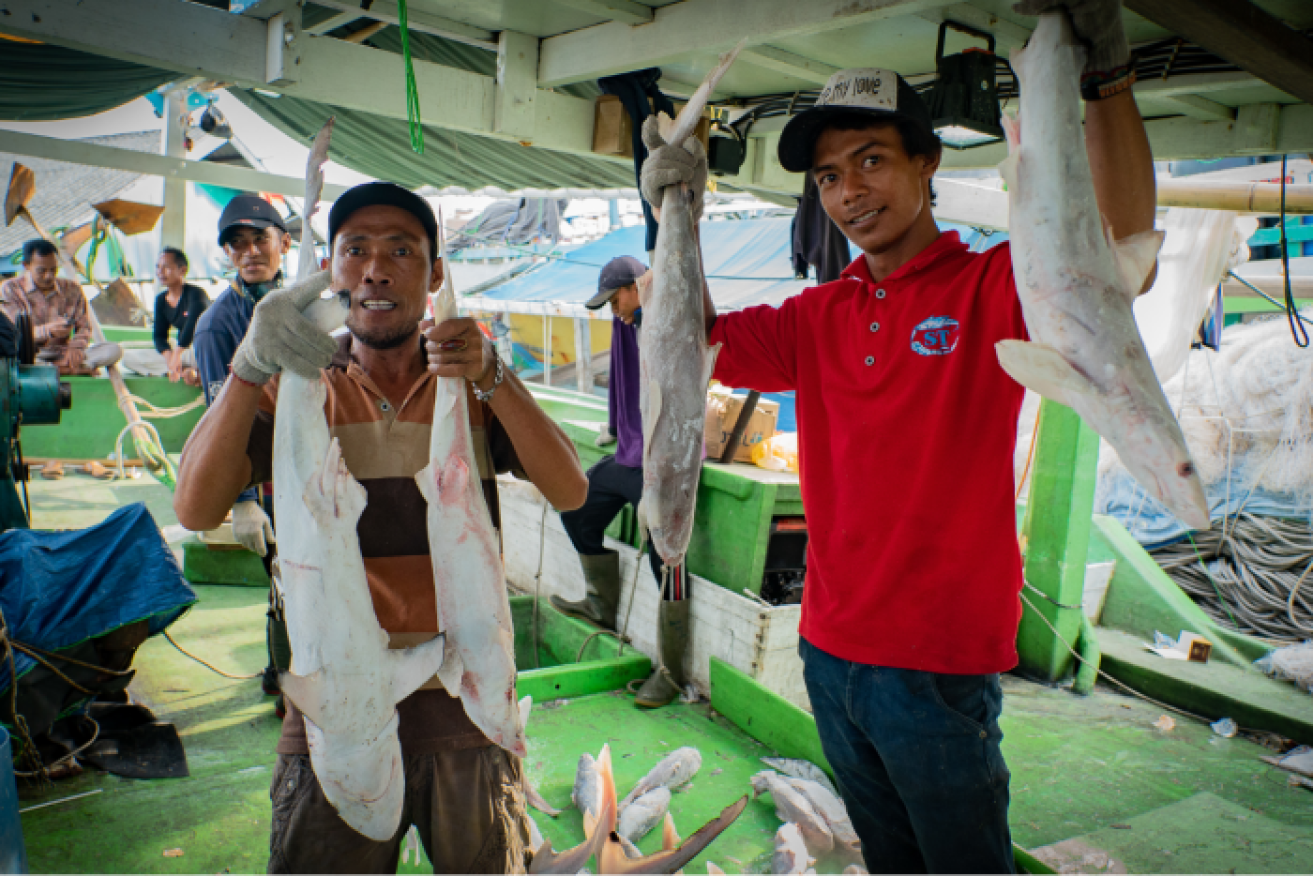Sharks killed in secretive Indonesian trade despite government efforts to protect some species

One third of Indonesia's sharks are threatened or endangered due to over-fishing. Photo: ABC News: Phil Hemingway
There were only a few sharks for sale on the day the ABC was invited to the fish market in the north Javanese city of Indramayu.
“No-one breaks the rules here … when [the fishermen] catch sharks in their nets, they release them back to their habitats, if the sharks are still alive,” said the chief of the local fisheries cooperative, Darto.
However, the following day the ABC turned up unannounced and found evidence of a thriving shark industry, with workers cutting off hundreds of shark fins right there on the dock.
Walking over a carpet of shark carcasses, the auctioneer barked numbers rapid-fire into a megaphone, as a small pack of buyers crowded around him.
Among the dead animals at their feet, leaking blood from their gills, were endangered hammerhead sharks, with their heads carved into a point to hide their distinctive mallet-shaped snouts.
Further down the dock, juvenile sharks were being stacked like firewood into trucks, and taken away for export.
Indonesia is believed to kill more sharks than any other nation on earth and, right now, thanks to a crackdown on foreign fishing vessels, the industry is booming.
This is despite an apparent decline in China’s appetite for shark-fin soup.

China’s appetite for shark fin soup is declining, but it’s still proving lucrative for Indonesian fishermen. Photo: ABC News: Phil Hemingway
“Shark fins are still economically lucrative for the fishers, especially those whose livelihoods are based on targeting sharks for the shark fin trade,” said Vanessa Jaiteh, a researcher on Indonesia shark fisheries.
Dr Jaiteh said even sharks caught by accident were often killed for their fins as a way to boost profits from the trip.
Her years of research have led the marine biologist to conclude fishing has had a “severe impact” on several shark populations in Indonesia.
“Older fishers recall catching many more sharks in their younger days, and even young fishers remember catching bigger and more sharks less than a decade ago,” she told the ABC.
Indonesian fishers target juvenile sharks
Cutting fins off sharks is not illegal in Indonesia, but the practice of finning them at sea, and throwing their helpless bodies back overboard, is believed to be one of the biggest threats to shark populations.
The practice is prevalent in eastern Indonesia, a poor region where fishing is an important coastal livelihood.
“I think it’s important to understand that some of these communities had subsistence economies before they entered the shark fin trade, which resulted in their shifting to cash economies,” Dr Jaiteh said.
The decline in the global shark-fin market has led some fishers to turn to radical practices to survive, including dynamite fishing and people smuggling.

Indonesia has taken steps to address falling shark numbers but there is no accurate data on current populations. Photo: ABC News: Phil Hemingway
Dwi Ariyoga Gautama from WWF said while industrial scale operations posed a significant threat to shark numbers, it was often smaller unregistered boats that caused the most damage.
“They don’t catch as many sharks as the industrial-scale boats but what they catch are juvenile sharks,” said Mr Gautama.
“There’s no chance for the sharks to recover. That’s why the impact on shark numbers is high and the population continues to decline.”
Around 30 per cent of Indonesia’s 117 known shark species are considered threatened or endangered.
But only nine species are managed by Government regulation and only one, the whale shark, is fully protected.
As well as the subterfuge and secrecy around shark fishing, there is also a severe lack of reliable data.
The most recent data estimates around 100,000 tonnes of sharks and rays are killed in Indonesia every year.
Dr Jaiteh said Indonesia has taken some decisive steps in addressing falling populations, including the development of a national plan of action and imposing export bans on some species.
But there is been no publicly available information on shark numbers or the total annual catch since 2016, despite local authorities collecting data.
That makes any accurate assessment of the threat to shark populations next to impossible.








